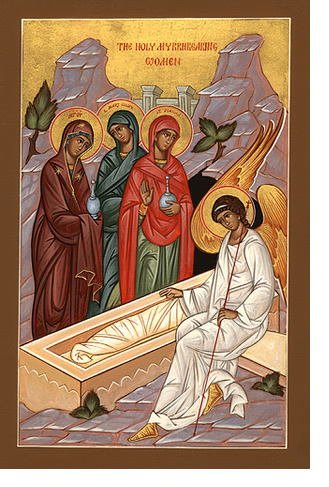|
|||
|---|---|---|---|
| This weekly bulletin insert complements the curriculum published by the Department of Christian Education of the Orthodox Church in America. This and many other Christian Education resources are available at http://dce.oca.org. | |||

Risk and courage are outstanding elements in the lives of the Myrrhbearing Women and also Joseph of Arimathea, who asked for and buried the body of Jesus Christ. Picture the women on the way to the tomb of Christ that very early, still-dark morning. It wasn't the safest time of day for a group of unaccompanied females to be on the road under any circumstances. But on this particular morning the Jewish authorities were hyper-vigilant and suspicious, and a detail of guards had been posted at the tomb. There were plenty of reasons for the women simply to be too afraid to go and anoint the Lord's body. Yet the Gospels tell us that they expressed only one concern: "Who will roll away the stone?" They were intent on doing what was proper for a beloved person who had died, and so they found their courage. Nor did they run away from the angel at the tomb, of whom they were indeed afraid, as Mark 16:8 tells us. They stayed, heard the angel's command, and rushed to carry it out by giving the apostles the good news of the resurrection (Luke 24:9). Joseph of Arimathea was a disciple of the Lord, but a secret one. The Gospels give us a few facts about him. He was a rich man, prominent in the community, and a member of the Sanhedrin, the council of Jewish leaders. It was due to his public visibility and his position as a council member that he kept his discipleship secret. So Joseph was probably not a person of great courage. Like many people with much to lose, he was not going to risk his place and possessions readily. Yet while the disciples fled and hid, Joseph stepped forward and declared himself a loving friend of the Lord at the moment when it was most dangerous to do so. Pontius Pilate had just condemned Jesus Christ to death. There had been no public outcry of protest; His followers were demoralized, fearful, and silent. Even Pilate—perhaps especially Pilate, with his self-protective and hesitant nature—must have been impressed by the bravery of this man coming forward, alone, to ask for the body of the executed preacher. 
The Gospels tell us that Joseph was a good and just man, and had not consented to the Sanhedrin's decision to condemn Jesus. This was an act of fortitude. But asking for the body was even more of a risk, because it brought him to the notice of the Romans and of his fellow Jewish leaders, most of whom had wanted Jesus to die. Only by "taking courage," as Luke writes, could Joseph make such a request. The danger faced by the Myrrhbearing Women as they walked to the tomb was real. So was the fear of losing position and security faced by Joseph. But they all found their courage, because they were "waiting for the Kingdom of God" (Mark 15:45). They saw that Kingdom in Jesus Christ, and fear would never be able to hold them back again. |
|||
